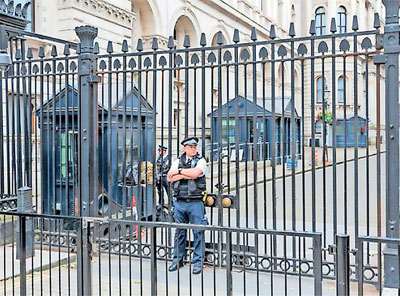Minimum entry bar for English HE ‘would level down opportunity’
 The Westminster government’s decision to revive the idea of restricting student numbers via a minimum grade requirement to enter university has brought warnings that such a policy would “level down opportunity” by hitting poorer students and those whose education has been disrupted by Covid. The government’s much-delayed interim response to the Augar review, published on 21 January, says that examination of “further reforms” will “include consideration of elements mentioned in the Augar report, including… minimum entry requirements to higher education institutions”.
The Westminster government’s decision to revive the idea of restricting student numbers via a minimum grade requirement to enter university has brought warnings that such a policy would “level down opportunity” by hitting poorer students and those whose education has been disrupted by Covid. The government’s much-delayed interim response to the Augar review, published on 21 January, says that examination of “further reforms” will “include consideration of elements mentioned in the Augar report, including… minimum entry requirements to higher education institutions”.
There will be a consultation on potential changes in the spring before the Augar review concludes at the next comprehensive spending review, the government says. A plan to restrict access to student loans using a minimum tariff threshold was a deeply controversial element of the Augar review’s deliberations – it is thought to have examined a DDD threshold at A level or equivalent. Chris Skidmore, then the universities minister, successfully fought the idea, which did not feature as a direct recommendation in the eventual 2019 Augar panel report.
Instead, the panel said a minimum entry requirement should be among the options considered by the government if universities have not addressed problems such as “poor long-term earnings benefits” on some courses by 2022. Mr. Skidmore, now a backbench MP, said following the publication of the Augar response that university “cannot be only for those whose circumstances allowed them to achieve their best”. “Talent is everywhere and opportunity is not, because simply too many pupils are denied the chance to succeed because of their background.
We must never lose sight of this reality when, after all, too many grades are too inaccurate to count,” Mr. Skidmore said. Diana Beech, a former policy adviser to Mr. Skidmore and other Conservative universities ministers, now chief executive of London Higher, said that with forthcoming cohorts of school-leavers having their pre-university education disrupted by Covid-19, “now is not the time to be further punishing these students for not achieving the grades they deserve”.
“Any attempt to impose minimum entry requirements on the Covid generation is extremely unfair to those who have experienced digital poverty and have been unable to learn to their full potential online,” Dr. Beech said, adding that such a plan “would mean university entry would become something only for those who can afford it or for those from backgrounds which enable them to excel”. Greg Walker, chief executive of MillionPlus, the association of modern universities, said that a minimum entry threshold would be “a policy to level down, not level up the opportunity”.
“Given the close correlation between social background and where you live, on the one hand, and academic attainment at 18 on the other, a grade threshold would exclude people in disadvantaged communities and from less well-off families from accessing HE,” he said. A minimum entry requirement could appeal to the Treasury as a way to lower the escalating costs of the student loans system – set to be pushed even higher by the pandemic’s impact on jobs and loan repayments – as well to those in government concerned about “low value” courses.
A recent report by the Higher Education Policy Institute projected that there would be demand for an extra 358,000 higher education places in England if participation increased at the same rate as the average of the past 10 years, alongside an increase in the population of 18-year-olds. Rachel Hewitt, deputy director of Hepi and author of that report, said: “Even the panel who authored the independent [Augar] report was less keen on introducing these than initially rumored, recommending that it was only introduced if their other recommendations did not bring about quick enough change.
” She added that such a plan “would have knock-on consequences for the growing number of 18-year-olds in the population, limiting their access to higher education and [be] likely to especially hit disadvantaged students”. While the Augar report referred to a “contextualized minimum entry threshold for access to Level 6 student finance for students under the age of 25”, the government’s Augar response refers to “minimum entry requirements to higher education institutions”. That crystallizes one of the concerns of universities, who say any bar on loan access would effectively amount to government intervention in their admissions – where universities have autonomy by law. A minimum entry requirement would require legislation, but the government has a comfortable majority in the House of Commons.
John. M – T.H.E









































.jpg)
.jpg)
.jpg)
.jpg)
.jpg)
.jpg)
